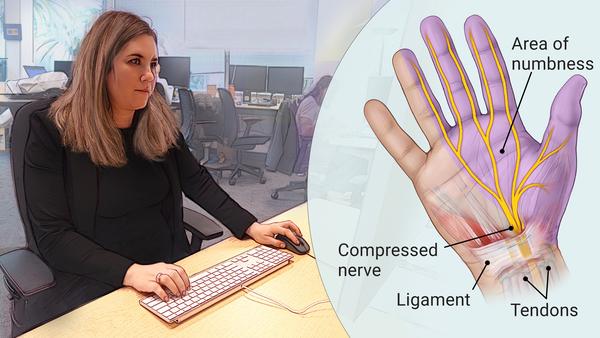
Carpal tunnel syndrome (CTS) is a common condition of the wrist and hand that can affect the use of the whole arm. It is caused by pressure on the nerve at the base of the palm. Because of the demands that people place on their hands and wrists, CTS is a common condition affecting 1 out of 20 Americans. Surgery for this condition is commonly performed on the wrist and hand. Fortunately for most people who develop CTS, physical therapy treatment can often relieve pain and numbness and restore normal use of the hand, wrist, and arm without the need for surgery.
Physical therapists work closely with other health care professionals to accurately diagnose and treat CTS. Symptoms of CTS are typical, and it is often possible to diagnose it without extensive testing. Physical therapists are experts in the movement and function of the body and will evaluate to determine all of the factors that may be contributing to your condition. After an evaluation, your physical therapist will prescribe your treatment plan based on your specific case.
Physical therapy treatment can be effective in reducing your symptoms and getting you back to performing normal activities. During your first visit with the physical therapist, be prepared to describe your symptoms in as much detail as possible, and say what makes your symptoms worse.
Depending upon the causes of your CTS, your therapy program may include education regarding changing wrist positions, general back and neck positions, exercises to increase the strength of the muscles in your hand, fingers, and forearm—and in some cases, the trunk and postural back muscles. It may also include stretching exercises to improve the flexibility of the wrist, hand, and fingers, use of heat/cold treatments to relieve pain, use of a night splint to reduce discomfort, and more.
The goals of physical therapy are to reduce your symptoms without the need for surgery, to enable you to be as active and functional as possible, and to help you resume your normal work, home, and leisure activities.
All physical therapists are prepared through education and experience to treat a variety of conditions, including CTS. However, you may want to consider:
- A physical therapist who is experienced in treating people with arm and hand musculoskeletal disorders and one who has experience in ergonomics and worksite evaluations. Ergonomics involves understanding the fit between a user (the person), the equipment, and the environment.
- A physical therapist who is a certified hand therapist (CHT).
- A physical therapist who is a board-certified clinical specialist or who has completed a residency or fellowship in orthopedic physical therapy. This therapist has advanced knowledge, experience, and skills that may apply to your condition.
As leaders in the physical therapy & occupational therapy industry, we believe that part of our mission is to help injured patients who cannot help themselves.
CardioFlex’s Physical therapists (PTs) are highly-educated, licensed health care professionals who can help patients reduce pain and improve or restore mobility. CardioFlex provides services that help restore function, improve mobility, relieve pain, and our PTs work side by side with patients to develop calculated and tailored programs that yield results like no tomorrow.
We offer free injury & conditioning advice. To set up an appointment please contact us at (954) 693-9090 – we are open Monday through Friday from 8 AM to 7 PM.
For more info visit: www.cardioflextherapy.com

About the Author Terry Abrams is the President & Director of Physical Therapy for CardioFlex Therapy, a start-up company founded in 2005 in Fort Lauderdale, FL. Delivering both Physical Therapy & Occupational Therapy, CardioFlex Therapy’s Outpatient Clinic is centrally located in Davie, FL serving the towns of Cooper City, Weston, Pembroke Pines, Plantation, Southwest Ranches, Hollywood, Miramar, Sunrise, & Fort Lauderdale. For Home Physical Therapy, CardioFlex sends its therapists to homes located in Broward, Dade, & Palm Beach counties.
